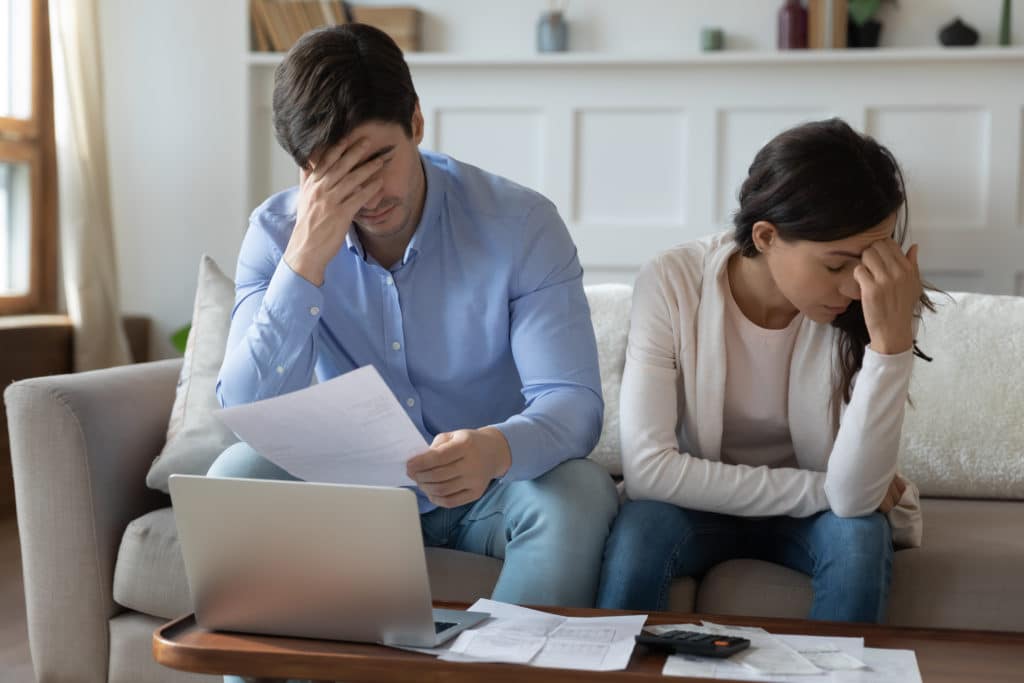LAS VEGAS DIVORCE AND BANKRUPTCY
Filing Bankruptcy After a Divorce in Las Vegas, Nevada
With divorce as prevalent as it is today, most people know that a divorce usually comes with significant costs. In fact, divorce is one of the leading causes of bankruptcy in the United States. Divorce is expensive, and sometimes recent divorcees struggle with adjusting to a single income. This can come along with other financial issues, making debt too difficult to repay. In the right circumstances, bankruptcy can help an individual struggling with debt after a divorce. For compassionate, qualified bankruptcy representation, call 702-370-0155 for your free consultation with one of our experienced Las Vegas bankruptcy lawyers.

Why Do People File Bankruptcy After Divorce?
As mentioned above, many people who have recently gone through a divorce struggle to adjust to their new lifestyles as well as their divorce attorneys’ bills. They may also now have to pay spousal maintenance and/or child support. Financial problems could have even been at least part of the reason behind the divorce.
Many people who divorce need to find new housing and possibly a new vehicle afterwards. It should be noted that filing bankruptcy will disqualify you from most home mortgages for 2 years after filing. You either need to purchase a home before filing or rent if you will need housing post- divorce and plan to file bankruptcy. But renting an apartment and qualifying for financing on a new vehicle won’t be easy if you have excessive debt on your credit report. While there is a common misconception that bankruptcy destroys your credit, we see many clients whose bankruptcy scores increase upon filing bankruptcy or shortly after. They can see significant improvement in their credit score if they make timely payments on lines of credit post-bankruptcy. Improving your credit score can improve your chances of approval on financial applications, and even qualify you for better interest rates and terms.
Another reason we see people wait until after divorce to file bankruptcy is because most of their debt is separate property. Arizona is a community property state, meaning that both assets and debts acquired during the marriage belong equally to each spouse. Debts incurred before and after the marriage are that spouse’s separate property.
FREQUENTLY ASKED QUESTIONS
BANKRUPTCY AND DIVORCE FAQs ANSWERED BY LAS VEGAS’ BEST DIVORCE ATTORNEY
BANKRUPTCY AND DIVORCE

Should I Declare Bankruptcy Before My Divorce is Finalized?
We see plenty of clients who come to us to discharge their debts in bankruptcy before they file for divorce. This can reduce the amount of debt that need to be split during property division, speeding up the divorce process in general. But if you’re going to file divorce after bankruptcy, we recommend waiting until your divorce is finalized. When your bankruptcy is filed, all your assets will be frozen. This makes it impossible to complete property division, and therefore your divorce, until your bankruptcy is discharged or dismissed. Depending on your circumstances and the bankruptcy chapter you file, this may or may not be a big deal. Call our bankruptcy team at 702-370-0155 to discuss.
How Your Divorce Decree Might Impact Your Bankruptcy Case
During property division, you and your spouse can agree to take on debts to get a larger share of a marital asset, or you might simply have more debts to divide than assets. Your divorce decree will state which spouse is responsible for which debts. However, creditors aren’t bound by divorce decrees. If the spouse responsible for a community property debt doesn’t pay, the other spouse can still be pursued for payment. If that spouse files bankruptcy to discharge a community debt they were ordered to pay in a divorce, that other spouse could be held liable. That is, unless the divorce decree includes an indemnification clause. An indemnification clause holds the spouse ordered to pay a debt in a divorce decree liable should the other spouse ever be pursued for its repayment. For example, let’s say the spouses bought a third vehicle during their marriage which ended up being out of their budget. The vehicle was eventually repossessed, and the vehicle sold at auction for less than the balance on their loan. This remaining balance, known as a repossession deficiency, is a community property debt. One spouse agrees to pay this debt in the divorce, but later files bankruptcy before paying off the deficiency balance. The auto lender pursues the other spouse for payment. If the divorce decree includes an indemnification clause, the spouse who had to pay can come after their ex for reimbursement.
Bankruptcy as an Option
If you’re considering bankruptcy, your divorce decree is just one of several documents that will be necessary to draft your divorce petition. Child support and spousal support orders will also be necessary for your divorce petition. The trustee may eventually request to see them, so it’s better to have them available when you file rather than scrambling to track down a copy on a trustee deadline. Another reason to have your divorce decree available while drafting your petition is to list your assets. Your bankruptcy petition needs to include a Schedule A/B form that lists every asset you own. Your divorce petition will clearly list which assets you retain ownership of after your divorce.
High Quality Las Vegas Bankruptcy Representation at Budget-Friendly Rates
The divorce process can be mentally exhausting. If you add debt issues on top of that, filing for bankruptcy afterwards can be extremely overwhelming. It could be easy to make mistakes like failing to list an asset you were awarded in the divorce, miscalculating your means test with your new household income and expenses, and discharging debts without realizing there is an applicable indemnification clause. These kinds of mistakes could make the cost of bankruptcy more than it’s worth. But when done right, bankruptcy can help you start your new life with a solid financial footing.

Our Las Vegas bankruptcy team is here to make sure that happens. We have years of experience helping Nevada residents discharge debts as quickly and painlessly as possible. Our clients move forward without debts, and often see huge credit improvements. We work hard to make you feel comfortable and confident throughout the process. To learn more about our services, as well as our affordable rates and payment plans starting at ZERO.
Income Qualification for Chapter 7 Bankruptcy
If you have secured and priority debts that need to be addressed, Chapter 13 bankruptcy might be your best option. However, most of our clients prefer to file Chapter 7 bankruptcy if they’re able. It is the most popular form of consumer bankruptcy and wipes away most unsecured debts. For many, income is a restriction that keeps them from filing for Chapter 7 bankruptcy.
To qualify for Chapter 7, your household income must fall below Nevada’s state median for your household size, or you must pass the means test. When you are married, your spouse’s income counts towards your total household income. After a divorce, your household income as an individual may fall within the guidelines to qualify you for Chapter 7 bankruptcy. Keep in mind that your income will be calculated using the past six months of your household income. If you are right on the cusp of qualifying for Chapter 7 bankruptcy and your spouse has an income, you may need to wait a few months after your divorce for your average household income to decrease.











